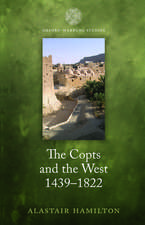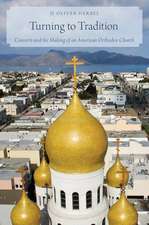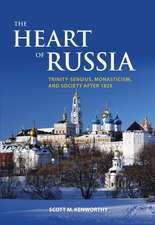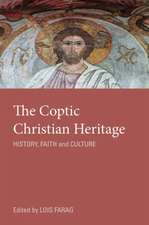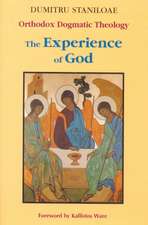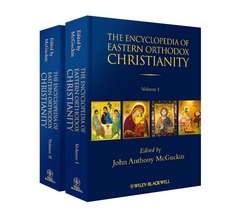The Way – Religious Thinkers of the Russian Emigration in Paris and Their Journal, 1925–1940
Autor Antoine Arjakovsky, Jerry Ryanen Limba Engleză Paperback – 29 oct 2013
The journal Put', or The Way, was one of the major vehicles for philosophical and religious discussion among Russian émigrés in Paris from 1925 until the beginning of World War II. This Russian language journal, edited by Nicholas Berdyaev among others, has been called one of the most erudite in all Russian intellectual history; however, it remained little known in France and the USSR until the early 1990s. This is the first sustained study of the Russian émigré theologians and other intellectuals in Paris who were associated with The Way and of their writings, as published in The Way. Although there have been studies of individual members of that group, this book places the entire generation in a broad historical and intellectual context. Antoine Arjakovsky provides assessments of leading religious figures such as Berdyaev, Bulgakov, Florovsky, Nicholas and Vladimir Lossky, Mother Maria Skobtsova, and Afanasiev, and compares and contrasts their philosophical agreements and conflicts in the pages of The Way. He examines their intense commitment to freedom, their often contentious struggles to bring the Christian tradition as experienced in the Eastern Church into conversation with Christians of the West, and their distinctive contributions to Western theology and ecumenism from the perspective of their Russian Orthodox experience. He also traces the influence of these extraordinary intellectuals in present-day Russia, Western Europe, and the United States.
Throughout this comprehensive study, Arjakovsky presents a wealth of arguments, from debates over "Russian exceptionalism" to the possibilities of a Christian and Orthodox version of socialist politics, the degree to which the church could allow its agenda to be shaped by both local and global political realities, and controversies about the distinctively Russian theology of Divine Wisdom, Sophia. Arjakovsky also maps out the relationships these émigré thinkers established with significant Western theologians such as Jacques Maritain, Yves-Marie Congar, Henri de Lubac, and Jean Daniélou, who provided the intellectual underpinnings of Vatican II.
"The Way is an important work, brilliantly researched, and the product of a true scholar who talks to us theologically as he progresses. Antoine Arjakovsky's main focus of interest is on ecumenical theology, and he argues convincingly that Orthodox thought as manifested in these leading-edge thinkers still has a major role to play in opening an authentically Orthodox but inclusive ecclesiological line of approach to contemporary Christianity." —John A. McGuckin, Union Theological Seminary
"The journal The Way was the heartbeat of the Russian religious intelligentsia from 1925 until the end of World War II, and no more creative band of religious thinkers existed anywhere in the world at the time than this small group of Russians coordinated by the indefatigable Berdyaev. This book is an extraordinarily rich study that deserves to be widely known. Its subject is of the first order of importance for modern intellectual history." —Paul Valliere, Butler University
"The Way is the first comprehensive study of one of the most important movements in modern Russian intellectual history. Arjakovsky provides a lucid account of a vibrant theological circle of Russian emigres in Paris who were in dialogue with their Western Christian counterparts. They sought to develop Christian thinking that remained rooted in tradition but could speak to modern problems, exploring its implications for philosophical, political, and cultural issues that still have much to say to contemporary Christian thought. We are deeply indebted to Arjakovsy for this masterful presentation." —Scott Kenworthy, Miami University
"Antoine Arjakovsky has provided English readers with the first in-depth study of an unparalleled creative moment in the history of modern Russian religious and Orthodox thought, the lasting impact of which has yet to be fully appreciated. Both a historical excursion and a critical intellectual enterprise in its own right, Arjakovsky’s study offers a detailed guide to the diversity of thought and philosophical debates among a stellar group of Russian émigré intellectuals. Those interested in the history of modern Orthodox Christian thought, Russian religious philosophy, and church politics among the first wave of Russia’s Orthodox emigration will find a trove of information in this volume." —Vera Shevzov, Smith College
Throughout this comprehensive study, Arjakovsky presents a wealth of arguments, from debates over "Russian exceptionalism" to the possibilities of a Christian and Orthodox version of socialist politics, the degree to which the church could allow its agenda to be shaped by both local and global political realities, and controversies about the distinctively Russian theology of Divine Wisdom, Sophia. Arjakovsky also maps out the relationships these émigré thinkers established with significant Western theologians such as Jacques Maritain, Yves-Marie Congar, Henri de Lubac, and Jean Daniélou, who provided the intellectual underpinnings of Vatican II.
"The Way is an important work, brilliantly researched, and the product of a true scholar who talks to us theologically as he progresses. Antoine Arjakovsky's main focus of interest is on ecumenical theology, and he argues convincingly that Orthodox thought as manifested in these leading-edge thinkers still has a major role to play in opening an authentically Orthodox but inclusive ecclesiological line of approach to contemporary Christianity." —John A. McGuckin, Union Theological Seminary
"The journal The Way was the heartbeat of the Russian religious intelligentsia from 1925 until the end of World War II, and no more creative band of religious thinkers existed anywhere in the world at the time than this small group of Russians coordinated by the indefatigable Berdyaev. This book is an extraordinarily rich study that deserves to be widely known. Its subject is of the first order of importance for modern intellectual history." —Paul Valliere, Butler University
"The Way is the first comprehensive study of one of the most important movements in modern Russian intellectual history. Arjakovsky provides a lucid account of a vibrant theological circle of Russian emigres in Paris who were in dialogue with their Western Christian counterparts. They sought to develop Christian thinking that remained rooted in tradition but could speak to modern problems, exploring its implications for philosophical, political, and cultural issues that still have much to say to contemporary Christian thought. We are deeply indebted to Arjakovsy for this masterful presentation." —Scott Kenworthy, Miami University
"Antoine Arjakovsky has provided English readers with the first in-depth study of an unparalleled creative moment in the history of modern Russian religious and Orthodox thought, the lasting impact of which has yet to be fully appreciated. Both a historical excursion and a critical intellectual enterprise in its own right, Arjakovsky’s study offers a detailed guide to the diversity of thought and philosophical debates among a stellar group of Russian émigré intellectuals. Those interested in the history of modern Orthodox Christian thought, Russian religious philosophy, and church politics among the first wave of Russia’s Orthodox emigration will find a trove of information in this volume." —Vera Shevzov, Smith College
Preț: 483.49 lei
Nou
Puncte Express: 725
Preț estimativ în valută:
92.52€ • 98.93$ • 77.14£
92.52€ • 98.93$ • 77.14£
Carte tipărită la comandă
Livrare economică 18 aprilie-02 mai
Preluare comenzi: 021 569.72.76
Specificații
ISBN-13: 9780268020408
ISBN-10: 026802040X
Pagini: 784
Ilustrații: 9 halftones
Dimensiuni: 160 x 234 x 45 mm
Greutate: 1.1 kg
Ediția:1st Edition
Editura: MR – University of Notre Dame Press
ISBN-10: 026802040X
Pagini: 784
Ilustrații: 9 halftones
Dimensiuni: 160 x 234 x 45 mm
Greutate: 1.1 kg
Ediția:1st Edition
Editura: MR – University of Notre Dame Press
Recenzii
"The Way is an important work, brilliantly researched, and the product of a true scholar who talks to us theologically as he progresses. Antoine Arjakovsky's main focus of interest is on ecumenical theology, and he argues convincingly that Orthodox thought as manifested in these leading-edge thinkers still has a major role to play in opening an authentically Orthodox but inclusive ecclesiological line of approach to contemporary Christianity." —John A. McGuckin, Union Theological Seminary
"The journal The Way was the heartbeat of the Russian religious intelligentsia from 1925 until the end of World War II, and no more creative band of religious thinkers existed anywhere in the world at the time than this small group of Russians coordinated by the indefatigable Berdyaev. This book is an extraordinarily rich study that deserves to be widely known. Its subject is of the first order of importance for modern intellectual history." —Paul Valliere, Butler University
"The Way is the first comprehensive study of one of the most important movements in modern Russian intellectual history. Arjakovsky provides a lucid account of a vibrant theological circle of Russian emigres in Paris who were in dialogue with their Western Christian counterparts. They sought to develop Christian thinking that remained rooted in tradition but could speak to modern problems, exploring its implications for philosophical, political, and cultural issues that still have much to say to contemporary Christian thought. We are deeply indebted to Arjakovsy for this masterful presentation." —Scott Kenworthy, Miami University
"Antoine Arjakovsky has provided English readers with the first in-depth study of an unparalleled creative moment in the history of modern Russian religious and Orthodox thought, the lasting impact of which has yet to be fully appreciated. Both a historical excursion and a critical intellectual enterprise in its own right, Arjakovsky’s study offers a detailed guide to the diversity of thought and philosophical debates among a stellar group of Russian émigré intellectuals. Those interested in the history of modern Orthodox Christian thought, Russian religious philosophy, and church politics among the first wave of Russia’s Orthodox emigration will find a trove of information in this volume." —Vera Shevzov, Smith College
“Antoine Arjakovsky . . . has written a masterful history of Russian religious thinkers who left Russia after the Bolshevik Revolution, took up residence in the West (mainly in Paris), and established a journal called Put’ or The Way. . . . In the end, Arjakovsky’s work is more than a history of the interwar Russian emigration and its periodical. It also is a thought-provoking reflection on some of the core values that led to separate Western and Orthodox civilizations, including such issues as papal primacy, the relationship of reason to faith, separation of church and state, and the critical importance of law in limiting government.” —The Catholic Historical Review
“An important and little known period in Western intellectual history is explored in this study of the Russian émigré journal, The Way, which was published in Paris during the years 1925–40 and edited by Nikolai Berdyaev. Antoine Arjakovsky’s scholarly history, translated from Russian, demonstrates convincingly that The Way was one of the most brilliant journals ever produced by Russian theologians and thinkers.” —Journal of Ecclesiastical History
"The book contains enough detail to be of use to scholars researching the interwar Russian intelligentsia in Europe, the life and struggles of the Russian Orthodox Church after the Revolution, the history of the ecumenical movement, and the modernist intellectual heritage. The study is both broad and deep enough that students well acquainted with the subject matter of the book will make new discoveries. The main source material, the articles published in the journal, is faithfully summarized and presented in context . . . Arjakovsky's book is important and valuable, perhaps even more now than in the past, and worthwhile as a guidebook to this important period in intellectual and religious history." —H-Catholic
"The journal The Way was the heartbeat of the Russian religious intelligentsia from 1925 until the end of World War II, and no more creative band of religious thinkers existed anywhere in the world at the time than this small group of Russians coordinated by the indefatigable Berdyaev. This book is an extraordinarily rich study that deserves to be widely known. Its subject is of the first order of importance for modern intellectual history." —Paul Valliere, Butler University
"The Way is the first comprehensive study of one of the most important movements in modern Russian intellectual history. Arjakovsky provides a lucid account of a vibrant theological circle of Russian emigres in Paris who were in dialogue with their Western Christian counterparts. They sought to develop Christian thinking that remained rooted in tradition but could speak to modern problems, exploring its implications for philosophical, political, and cultural issues that still have much to say to contemporary Christian thought. We are deeply indebted to Arjakovsy for this masterful presentation." —Scott Kenworthy, Miami University
"Antoine Arjakovsky has provided English readers with the first in-depth study of an unparalleled creative moment in the history of modern Russian religious and Orthodox thought, the lasting impact of which has yet to be fully appreciated. Both a historical excursion and a critical intellectual enterprise in its own right, Arjakovsky’s study offers a detailed guide to the diversity of thought and philosophical debates among a stellar group of Russian émigré intellectuals. Those interested in the history of modern Orthodox Christian thought, Russian religious philosophy, and church politics among the first wave of Russia’s Orthodox emigration will find a trove of information in this volume." —Vera Shevzov, Smith College
“Antoine Arjakovsky . . . has written a masterful history of Russian religious thinkers who left Russia after the Bolshevik Revolution, took up residence in the West (mainly in Paris), and established a journal called Put’ or The Way. . . . In the end, Arjakovsky’s work is more than a history of the interwar Russian emigration and its periodical. It also is a thought-provoking reflection on some of the core values that led to separate Western and Orthodox civilizations, including such issues as papal primacy, the relationship of reason to faith, separation of church and state, and the critical importance of law in limiting government.” —The Catholic Historical Review
“An important and little known period in Western intellectual history is explored in this study of the Russian émigré journal, The Way, which was published in Paris during the years 1925–40 and edited by Nikolai Berdyaev. Antoine Arjakovsky’s scholarly history, translated from Russian, demonstrates convincingly that The Way was one of the most brilliant journals ever produced by Russian theologians and thinkers.” —Journal of Ecclesiastical History
"The book contains enough detail to be of use to scholars researching the interwar Russian intelligentsia in Europe, the life and struggles of the Russian Orthodox Church after the Revolution, the history of the ecumenical movement, and the modernist intellectual heritage. The study is both broad and deep enough that students well acquainted with the subject matter of the book will make new discoveries. The main source material, the articles published in the journal, is faithfully summarized and presented in context . . . Arjakovsky's book is important and valuable, perhaps even more now than in the past, and worthwhile as a guidebook to this important period in intellectual and religious history." —H-Catholic
"The Way, Antoine Arjakovsky's magisterial study of the Russian emigration of the interwar period, published in French over a decade ago and already translated into Russian, is now available to the English-speaking world thanks to a new translation by Jerry Ryan. This is a work of major importance that will become a standard point of reference for everyone with an interest, scholarly or otherwise, in the philosophical, political and religious culture of the Russian intelligentsia in exile." —Times Literary Supplement
“This is the story of an important journal, which is now receiving increased attention from scholars, but it is more than that. It presents the work of a creative and diverse group of theologians thrown together by political accident in a foreign land, and shows how their struggle to make sense of this has a continuing and contemporary message for the church.”—Journal of Theological Studies
“The Way is a product of Arjakovsky’s dissertation, and the book’s objective is threefold: to give a wide audience access to this little-known journal, to explain the resurgence of interest in the journal in both Russia and France since the early 1990s, and to elaborate a synthesis between historical truth and the accuracy of memory. He succeeds in all three: the book is an extensive and well crafted synthesis of the articles published in the journal, with a skillfully explicated analysis set within the historical context of both the journal’s own time as well as current interest in the journal for the last couple of decades.”—Fides et Historia
“This is the story of an important journal, which is now receiving increased attention from scholars, but it is more than that. It presents the work of a creative and diverse group of theologians thrown together by political accident in a foreign land, and shows how their struggle to make sense of this has a continuing and contemporary message for the church.”—Journal of Theological Studies
“The Way is a product of Arjakovsky’s dissertation, and the book’s objective is threefold: to give a wide audience access to this little-known journal, to explain the resurgence of interest in the journal in both Russia and France since the early 1990s, and to elaborate a synthesis between historical truth and the accuracy of memory. He succeeds in all three: the book is an extensive and well crafted synthesis of the articles published in the journal, with a skillfully explicated analysis set within the historical context of both the journal’s own time as well as current interest in the journal for the last couple of decades.”—Fides et Historia
“Arjakovsky introduces into the rapidly growing canon of works in English translation a book that fills a large gap in our understanding of the inner workings of one of the most important journals of the twentieth century.”—The NEP Era: Soviet Russia, 1921-1928
“ . . . in the majority of themes he touches, from the internal divisions of the church and the exiles, to the theological content of the work of Florovsky and Bulgakov and the philosophies of Berdyaev, Shestov, Frank, and others, Arjakovsky is on firm ground, showing a mastery of the various subjects that arise throughout the contributions to the journal over the decade and a half of existence. . . . Arjakovsky’s book is important and valuable, perhaps even more now than in the past, and worthwhile as a guidebook to this important period in intellectual and religious history.”—H-Catholic, H-Net Reviews
“To the credit of Antoine Arjakovsky, The Way seems to manage the impossible: a tempered, meticulous parceling out of the diverse theological and philosophical debates surrounding the influential Parisian expat journal Put’ (The Way) and its various (mostly Russian) contributors . . . an invaluable resource for those interested in the discussions, agreements, and conflicts of the intellectual circles of interwar exile, be it from a literary, philosophical, theological, or diasporic perspective.” —Slavic and East European Journal
"Arjakovsky’s study reveals a poorly known Christian exile community in its intellectual complexity. His chronicle depicts the richness of a Slavic theology and philosophy usually presented in the West through a series of pious clichés. It also reveals the dynamics of an immigrant community struggling to maintain its (idealized) traditions and cautiously adapt to its new political-religious environment in a fragile intellectual enclave in Montparnasse. Few communities have negotiated this perilous retrieval and adaptation with such metaphysical glory." —America
“This is a remarkable but demanding, even daunting, history of the Russian religious-philosophical emigration in interwar France . . . [Berdiaev and Maritain’s] profound personalist defense of human dignity and human rights is a legacy that Arjakovsky rightly deems worth remembering (not least in Putin’s Russia). The Way as a ‘locus of memory’ (Pierra Nora) forms yet another conceptual layer of this rich, rewarding, and complex book.” —Slavic Review
“ . . . in the majority of themes he touches, from the internal divisions of the church and the exiles, to the theological content of the work of Florovsky and Bulgakov and the philosophies of Berdyaev, Shestov, Frank, and others, Arjakovsky is on firm ground, showing a mastery of the various subjects that arise throughout the contributions to the journal over the decade and a half of existence. . . . Arjakovsky’s book is important and valuable, perhaps even more now than in the past, and worthwhile as a guidebook to this important period in intellectual and religious history.”—H-Catholic, H-Net Reviews
“To the credit of Antoine Arjakovsky, The Way seems to manage the impossible: a tempered, meticulous parceling out of the diverse theological and philosophical debates surrounding the influential Parisian expat journal Put’ (The Way) and its various (mostly Russian) contributors . . . an invaluable resource for those interested in the discussions, agreements, and conflicts of the intellectual circles of interwar exile, be it from a literary, philosophical, theological, or diasporic perspective.” —Slavic and East European Journal
"Arjakovsky’s study reveals a poorly known Christian exile community in its intellectual complexity. His chronicle depicts the richness of a Slavic theology and philosophy usually presented in the West through a series of pious clichés. It also reveals the dynamics of an immigrant community struggling to maintain its (idealized) traditions and cautiously adapt to its new political-religious environment in a fragile intellectual enclave in Montparnasse. Few communities have negotiated this perilous retrieval and adaptation with such metaphysical glory." —America
“This is a remarkable but demanding, even daunting, history of the Russian religious-philosophical emigration in interwar France . . . [Berdiaev and Maritain’s] profound personalist defense of human dignity and human rights is a legacy that Arjakovsky rightly deems worth remembering (not least in Putin’s Russia). The Way as a ‘locus of memory’ (Pierra Nora) forms yet another conceptual layer of this rich, rewarding, and complex book.” —Slavic Review
"The Way, Antoine Arjakovsky's magisterial study of the Russian emigration of the interwar period, published in French over a decade ago and already translated into Russian, is now available to the English-speaking world thanks to a new translation by Jerry Ryan. This is a work of major importance that will become a standard point of reference for everyone with an interest, scholarly or otherwise, in the philosophical, political and religious culture of the Russian intelligentsia in exile." —Times Literary Supplement
“Antoine Arjakovsky . . . has written a masterful history of Russian religious thinkers who left Russia after the Bolshevik Revolution, took up residence in the West (mainly in Paris), and established a journal called Put’ or The Way. . . . In the end, Arjakovsky’s work is more than a history of the interwar Russian emigration and its periodical. It also is a thought-provoking reflection on some of the core values that led to separate Western and Orthodox civilizations, including such issues as papal primacy, the relationship of reason to faith, separation of church and state, and the critical importance of law in limiting government.” —The Catholic Historical Review
“An important and little known period in Western intellectual history is explored in this study of the Russian émigré journal, The Way, which was published in Paris during the years 1925–40 and edited by Nikolai Berdyaev. Antoine Arjakovsky’s scholarly history, translated from Russian, demonstrates convincingly that The Way was one of the most brilliant journals ever produced by Russian theologians and thinkers.” —Journal of Ecclesiastical History
"The book contains enough detail to be of use to scholars researching the interwar Russian intelligentsia in Europe, the life and struggles of the Russian Orthodox Church after the Revolution, the history of the ecumenical movement, and the modernist intellectual heritage. The study is both broad and deep enough that students well acquainted with the subject matter of the book will make new discoveries. The main source material, the articles published in the journal, is faithfully summarized and presented in context . . . Arjakovsky's book is important and valuable, perhaps even more now than in the past, and worthwhile as a guidebook to this important period in intellectual and religious history." —H-Catholic
Notă biografică
ANTOINE ARJAKOVSKY has a doctorate in History and is the Director of Research at the Collège des Bernardins in Paris, as well as the President of the Association des Philosophes Chrétiens. He is also the founder of the Institute for Ecumenical Studies in Lviv, Ukraine. Among his other commitments, he is a director of the Semaines Sociales de France, is a vice-president of the Artisans de Paix, and is a member of the executive board of the Platform of European Memory and Conscience.


